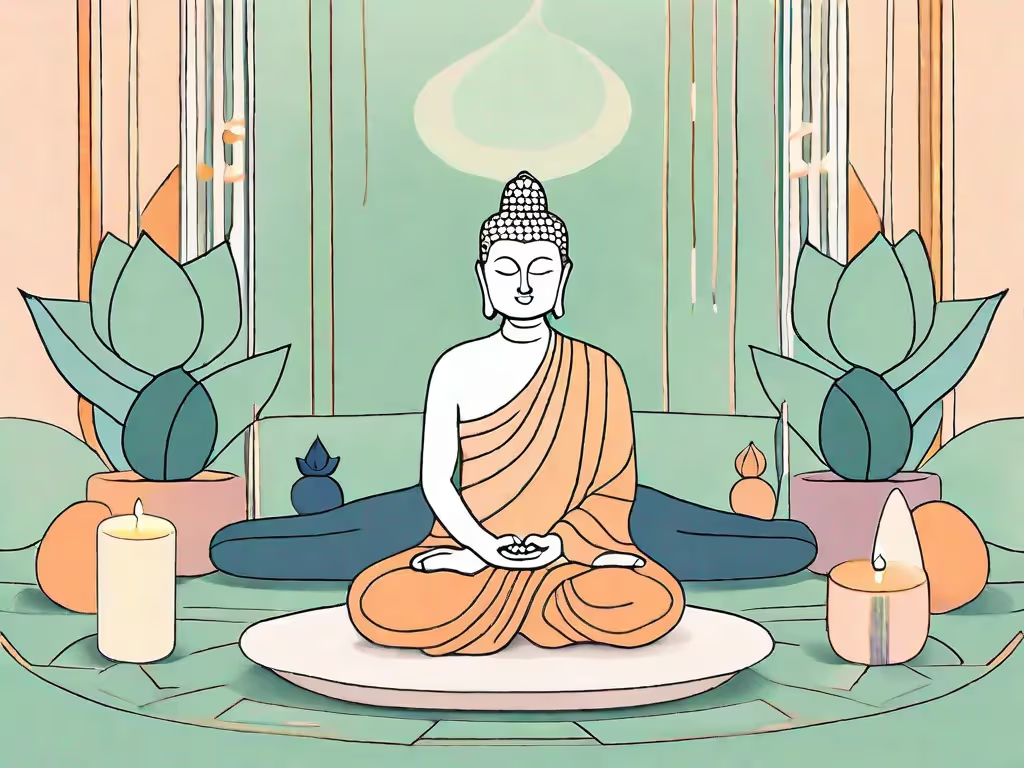There's something about the quiet self reflection of a journal entry, no matter where it's penned, that appeals to the part of us that yearns to be ever present. I think that's why Joan Didion said, "I write entirely to find out what I'm thinking, what i'm looking at, what I see and what it means. What I want and what I fear." In looking at all those things on paper we can understand more about ourselves, where we've been, and where we think we're going.
Combine the simple act of writing our thoughts down on paper with mindfulness and we get the practice of mindful journaling that can help us shift our awareness into the present moment. At first glance, if this sounds like rubbing your belly and patting your head at the same time — you're not alone! What makes mindful journaling different from a regular journaling practice is that we use mindfulness principles like nonjudgemental thinking and grounding techniques to become more present as we write. So in case you're still wondering, "What is mindful journaling?" it's simply the powerful act of combining journaling and mindfulness practices to better capture what you're thinking.
Sounds fun, right? Or at least intriguing. Whether you want to start your own practice to deepen self awareness or make fuzzy thoughts more "crisp" around the edges, we put together a set of tips and prompts to help you open up and express yourself. Remember that this journal is yours. Your practice is an expression of you, which means that you should use whatever medium comes natural for you. If writing doesn't work for you, try drawing, painting, or collages.
Incorporate whatever helps you bring your thoughts to life in a way that you can understand. This is your mindful journal, so don't be afraid to make it yours.
A quick intro to mindfulness
The term mindfulness is everywhere, but its exact meaning can feel elusive. At its core, to be mindful means to be present and aware. Rather than being caught up in thoughts about what was said in a conversation two weeks ago or how nervous we are about tomorrow’s presentation. A mindful person is present to experience it all, engage in the world, participate fully, and notice the thoughts without allowing them to distract or overwhelm us.
Author and meditation teacher, Joseph Goldstein, says, "Every time we become aware of a thought, as opposed to being lost in a thought, we experience that opening of the mind."
As many of us have experienced, simply being mindful is not as easy as it sounds. Our minds wander or we get distracted. Repeatedly being carried away by our thoughts can make us feel like mindfulness is out of reach. What can bring it back into grasp is mindful journaling!
When you being to write, remember that mindfulness is the ongoing practice of opening the mind and observing our thoughts without attachment. Thoughts will always be there, but choosing to recognize them and let them go is the practice.
A crash course in mindful journaling
Let's face it, healthcare is expensive. The more we can provide for our own wellbeing, the more resilient we'll be when we encounter challenges throughout our lives. Mindful journaling is an economically savvy way to protect our health, reduce anxiety, and support a deeper sense of self-awareness.
Journaling is utilized in therapy and coaching sessions for good reason. It is a powerful tool to help pull us into the moment, address distracting thoughts, and release burdensome emotions. Research has even shown that the simple act of keeping a journal may reduce anxiety.
With all these benefits, it’s a wonder we’re not all keeping mindful journals daily. But the fact is, life is full of distractions, and it can be easy to forget to invest in ourselves.
To begin to create a mindful journaling habit, let’s begin with tips for overcoming common barriers to starting your own practice.
Overcoming the common pitfalls when starting a mindful journal
Finding the time
It can be easy to tell ourselves that we don’t have enough time to write every day, so let’s start small. Think about your average day and what time you could realistically devote even five or ten minutes to mindful journaling. For many of us it's right before we go to bed or first thing in the morning.
We found that we're more successful when we set a regular routine, while recognizing that life will happen and we'll inevitably need to make exceptions to the schedule. This is the perfect time to practice self-care and allow your journaling schedule to flex as much as you need it to. Remember, mindful journaling should work for you, so it's perfectly normal to aim for one session a week when you're just getting started.
💡 Tip: Set an alarm at the same time each day to remind yourself to journal.
Getting the motivation
While you may have great intentions, sometimes it’s easy to get distracted from your goal of a regularly keeping a mindful journal. To address this, and to have more fun with it, you can invite a friend to join you on your challenge or join a community, where you can find accountability partners and coaches to support you (wink - we might know one).
We love to listen to instrumentals or white noise in the background while we write journal entires. It helps us stay present in the moment and not get overwhelmed by a blank page staring back at us.
💡 Tip: Gift a friend a mindfulness journal to make it easier for them to join you!
Putting pen to paper
Mindful journaling sounds wonderful, but it can be difficult to figure out where to begin. Yes, even the most prolific writers experience the "Cold Start Problem". There are different forms of mindful journaling prompts that you might want to experiment with. Expressive writing means exploring deep-seated emotions, which can be an extremely powerful mindfulness practice. You can also begin with a gratitude journal or a list of things that went well in your day.
💡 Tip: Try penning an entry about what mindfulness and journaling might mean for you as a way to start your practice.
Buy a mindful journal that catches your attention
We know it sounds strange, but if you're keeping a physical journal then make sure to find one you feel excited to write in. Little things like the size of paper, notebook binding, and overall aesthetic may influence your decision to write more than you anticipate. Make sure that it's something easy to travel with, as traveling is always the perfect time to practice mindful journaling.
If you don’t consider yourself a writer, beginning with a bulleted list is an excellent way to journal. You can capture your feelings, sensations, and thoughts in short phrases or even single words. As you get started, you can experiment with these three different versions of mindful journaling and see what resonates for you. Remember this practice is for you, so don't hesitate to adapt the recommendations to find what makes you feel more present as you write.
Ultimately, capturing your thoughts, feelings, and sensations on the page in ways that are most accessible to you will best support you in creating a habit of mindful journaling. The key is to capture these present observations without judgment. It's common for writers to read their words back and feel that deeply held negative beliefs or emotions have less power.
To capture what we are thinking on the page invites us to slow down, assess, and safely explore how we feel. Make sure to check in with yourself while you're working on a mindful journal entry. If you feel like the emotions are becoming too overwhelming at any point, then don't hesitate to take a break.
Tip: A great way to make sure that you're staying present while journaling is to place your feet firmly on the ground and try box breathing: inhale for 4 breaths, hold for 7 breaths, and exhale for 8 breaths. That should help you breath through challenging emotions that might be coming up for you as you journal.
Try different forms of journaling
Mindful journal prompts
And if the concept of mindfulness has always seemed out of reach for you, we hope that one of the prompts below make it easier to get started. They might lead you to a new perspective, more harmony, and better overall health and well-being.
💡Tip: Set a five or ten-minute timer and see how many words you can get on the page.
Expressive Journal Prompts
These mindful writing prompts are geared at helping you direct your attention to thoughts and feelings that you want to more deeply understand.
- Think about the emotion that was dominant for you today. What images or sensations does that emotion evoke?
- Write about what brings you comfort and why.
- Notice how your body is feeling right now and write about everything, from the room's temperature to the aches and pains to the feelings of ease and softness.
- What would an older, wiser version of yourself tell you about your life?
- Do a worry dump. Let it all out, from minor concerns to heavy worries. Let the page carry it all.
Insight Journal Prompts
With these prompts our goal is to develop deeper insight about ourselves and how we think about the world around us. Through these, we'll get to deepen our sense of self opposed to simply focusing on the present.
- Think about your day from start to finish. What scene stands out to you most and why?
- What decisions did I make today that I’m proud of?
- What are the three things you most remember about this day?
- Reflect on conversations you had today. What went unsaid?
- Write about a person or multiple people who have positively impacted your life.
Listing Journal Prompts
List prompts are here to help even the busiest folks squeeze in time for mindful journaling. The goal is to get short phrases down on paper that help you reflect.
- List all the good things that happened today. When you think you’re done, see if you can list one more.
- Make a gratitude list of at least 10 things, people, or experiences you are thankful for.
- Make a list of 3 things you saw, heard, smelled, touched, and tasted today. See where this prompt takes you.
- Make a list of the important things that were said today, either by you or others.
- List all the dominant sensations in your body—what are they telling you?
💡Tip: Set a five or ten-minute timer and see how many words you can get on the page.
Another powerful way to build a mindful journaling practice is to keep a journal after meditating. Often times when our mind is resting, new insight about how we think about ourselves and the world around us can emerge.
Practicing mindfulness while journaling
Aside from going through specific prompts, using mindfulness techniques while you journal can help you stay connected with your intentions. We think one of the most important things is an open mind. As you explore your thoughts and feelings during your journaling practice, don't forget to use mindfulness techniques to stay present.
When our minds inevitably wander, we like to use a grounding technique where we engage all of our senses: taste, hearing, sight, smell, and touch. By expanding our awareness to answer questions like what are we tasting right now? what's in our field of sight? what does it smell like? feel like? we're able to stay with the thoughts and feelings for longer.
While building a mindful journaling practice might seem overwhelming, remember to start small and reward yourself for what you do. After adopting this practice, a lot of folks have reported being more focused and positive, better handling negative thoughts and emotions, and enjoying the process.
The beauty of mindful writing is that it’s practical for busy people and doesn’t require a lot of time. You can do it anywhere, with as little or as much time as you’d like, and there is no great cost for the immeasurable benefits that come with increasing awareness and presence. You can start today. All you need is a few minutes and something to write on.Even a napkin will do!
If you’re looking for more guidance and community support, join me at Aura, the most holistic meditation app on the market, for 30 days free. Aura provides a meditation journal that allows you to combine mindfulness and meditation practices with reflection. You can also read others’ public reflections to find inspiration.



.webp)







.avif)

%20(1).avif)


.avif)
.avif)
.webp)


.avif)


















































































































.avif)

















.svg)









